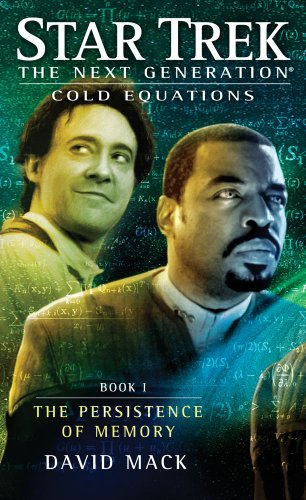Re: TNG: The Persistence of Memory by David Mack Review Thread (Spoile
Re: Data resurrection subject
I am firmly of the subject that copying a person's memories does not make a person the subject. The best analogy I can make is the Voyager episode "Living Witness." The Doctor's backup is, basically, a clone of the Doctor. He has an idential personality, obviously, but he's in two separate places and they will gradually become different people. The equivalent of Thomas and Will Riker, for example.
I don't consider this "resurrection" in the same way as Q snapping his fingers and bringing someone back from the dead or Spock on Genesis. However, since Data is an electronic being, I think we tend to assume he's restored to life the way Soleta said holograms could be in "Blind Man's Bluff." The new Soong entity isn't Data but he's pretty damn close, enough that I can easily see him filling the role in fan's hearts, but I like how it's not really just Data returned. Sort of like someone recreating Captain Kirk from a pattern in the transporter, some existential angst is to be expected.
Re: Choudhury's death
I was actually really upset by her death, almost as much as Tasha Yar's own from way back when I was a wee little tot. I am of the school that the novels are a place where original characters can become as important and plot centric as the main universe character. Much to everyone's horror, I'm sure, I'm a fan of Star Wars' EU as well with original characters marrying Skywalkers and getting their own books.
While I haven't read much of her, I really enjoyed her in Destiny and was actually rather saddened Worf didn't want his relationship with Choudhury to get too serious. Seeing her causally killed by the Breen made me want to have the whole lot of them blown to atoms. What a tragedy.
Re: Data resurrection subject
I am firmly of the subject that copying a person's memories does not make a person the subject. The best analogy I can make is the Voyager episode "Living Witness." The Doctor's backup is, basically, a clone of the Doctor. He has an idential personality, obviously, but he's in two separate places and they will gradually become different people. The equivalent of Thomas and Will Riker, for example.
I don't consider this "resurrection" in the same way as Q snapping his fingers and bringing someone back from the dead or Spock on Genesis. However, since Data is an electronic being, I think we tend to assume he's restored to life the way Soleta said holograms could be in "Blind Man's Bluff." The new Soong entity isn't Data but he's pretty damn close, enough that I can easily see him filling the role in fan's hearts, but I like how it's not really just Data returned. Sort of like someone recreating Captain Kirk from a pattern in the transporter, some existential angst is to be expected.
Re: Choudhury's death
I was actually really upset by her death, almost as much as Tasha Yar's own from way back when I was a wee little tot. I am of the school that the novels are a place where original characters can become as important and plot centric as the main universe character. Much to everyone's horror, I'm sure, I'm a fan of Star Wars' EU as well with original characters marrying Skywalkers and getting their own books.
While I haven't read much of her, I really enjoyed her in Destiny and was actually rather saddened Worf didn't want his relationship with Choudhury to get too serious. Seeing her causally killed by the Breen made me want to have the whole lot of them blown to atoms. What a tragedy.



